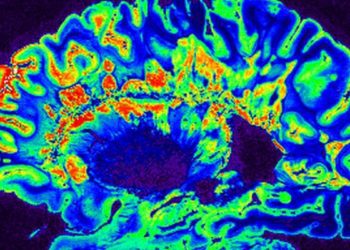The DEFINE trial: BG-12 reduces relapse rate in multiple sclerosis [Classics Series]
Image: PD
1. BG-12 (dimethyl fumarate) significantly reduces relapse rates, disability progression, and image detectable lesion load over a two-year period.
2. BG-12 is associated with higher rates of transient flushing and gastrointestinal events.
Original Date of Publication: September 20, 2012
Study Rundown: In this phase 3 trial, BG-12 (dimethyl fumarate) significantly decreased the annualized relapse rate as compared to placebo regardless of the frequency of administration (i.e., BID vs. TID). Moreover, BG-12 significantly reduced the rate of progression of disability and decreased the number of new or enlarging hyperintense lesions on T2-weighted MRI. Treatment with BG-12 was associated with increased rates of flushing, though there were no significant differences in rates of discontinuation between study groups. In summary, BG-12 significantly reduces relapse rates of multiple sclerosis (MS) as compared to placebo (P<0.001), regardless of the frequency of administration. The findings of this study are very similar to those of the CONFIRM trial, which also compared BG-12 with placebo. While these results are promising, studies comparing the efficacy and safety of BG-12 with approved therapies for MS are needed.
Please click to read study in NEJM
In-Depth [randomized, controlled study]: Originally published in 2012 in NEJM, the DEFINE trial assessed the efficacy and safety of BG-12 in relapsing-remitting MS over a 96-week period. A total of 1,234 patients underwent randomization in a 1:1:1 ratio to three study arms: 1) BG-12 240 mg BID, 2) BG-12 240 mg TID, and 3) placebo. The study was conducted at 198 sites in 28 countries.
The annualized relapse rates were 0.17 (95%CI 0.14-0.21) for the BG-12 BID group and 0.19 (95%CI 0.15-0.23) for the BG-12 TID group, compared to a rate of 0.36 (95%CI 0.30-0.44) for the placebo group. The differences in relapse rates between BG-12 and placebo were significant and independent of dose frequency. Notably, 38% of the BID and 32% of the TID groups experienced flushing as an adverse event, as compared to 5% of those taking placebo. A similar number of patients in each group experienced some type of adverse event (approximately 95-96%), including MS relapse. Infection rates were also similar across all groups and did not differ with regards to frequency of BG-12 administration (65% for placebo, 64% in the BID group, and 68% in the TID group).
By Jose-Marc Techner, Andrew Cheung, M.D.
© 2013 2minutemedicine.com. All rights reserved. No works may be reproduced without written consent from 2minutemedicine.com. Disclaimer: We present factual information directly from peer reviewed medical journals. No post should be construed as medical advice and is not intended as such by the authors or by 2minutemedicine.com. PLEASE SEE A HEALTHCARE PROVIDER IN YOUR AREA IF YOU SEEK MEDICAL ADVICE OF ANY SORT. Content is produced in accordance with fair use copyrights solely and strictly for the purpose of teaching, news and criticism. No benefit, monetary or otherwise, is realized by any participants or the owner of this domain.








